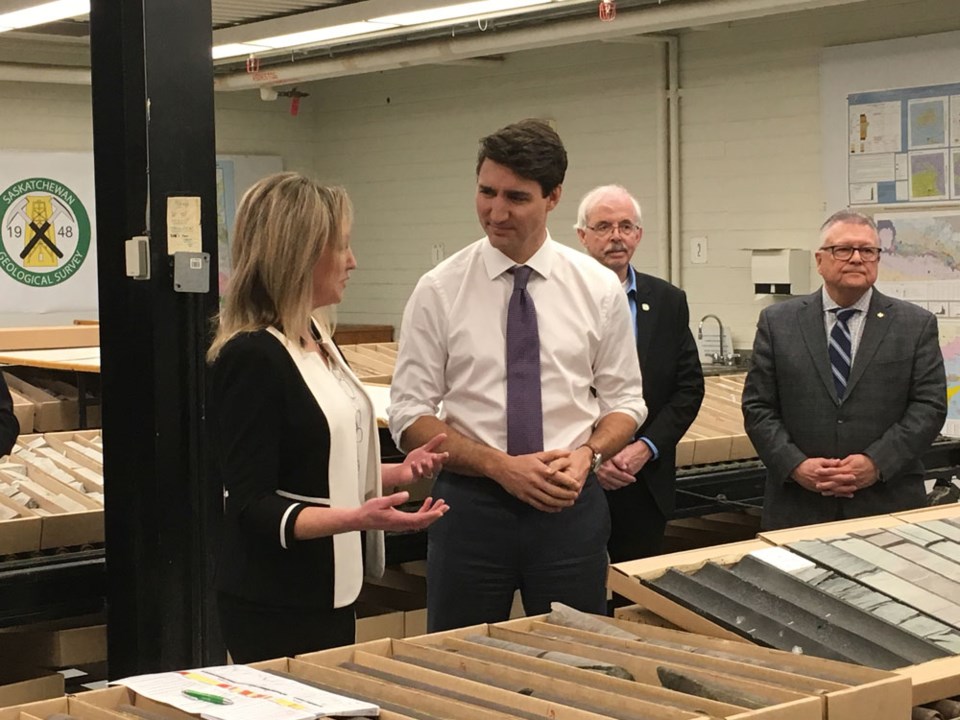Prime Minister Justin Trudeau has announced support for the new geothermal power facility near Torquay.
The energy project, led by DEEP Earth Energy Production Corporation, is the first of its kind in Canada and taps into a new renewable energy resource.
Geothermal energy harnesses heat from the earth’s crust and transforms it into electricity to power homes and businesses year-round. DEEP’s geothermal facility will build on Saskatchewan’s leadership in the energy sector, using familiar drilling technologies from the oil, gas, and mining industries to tap into this reliable energy source.
The Government of Canada will provide $25.6 million in funding for the five-megawatt facility, which will produce enough energy to power approximately 5,000 homes all while taking the equivalent of the yearly emissions of 7,400 cars out of the atmosphere.
“Today’s announcement is an investment in the future of Saskatchewan, and all our children,” said Trudeau, who made the announcement Friday in Regina. “DEEP’s project has the potential to transform how the province and the country produces energy, while creating good, middle class jobs for Canadians. This is another example of how we’re taking action to fight climate change today while strengthening our communities for tomorrow.”
The project will create 100 jobs during construction, and provide the provincial power grid with clean, renewable energy, and create new business opportunities for local communities.
Funding for this project is being provided through Natural Resources Canada’s Emerging Renewable Power Program. In 2014, Natural Resources Canada contributed $1 million through its Ecoenergy Innovation Initiative for a pre-feasibility study for this project. Natural Resource Canada’s Clean Energy Innovation Program and Innovation Saskatchewan also contributed $350,000 and $175,000, respectively, towards test drilling. The total cost of the project is $51.3 million.
Also on Friday, Deep Earth Energy Production Corp. (DEEP) announced the successful drilling of its first geothermal test well.
The vertical well, managed by Frontier Project Solutions and drilled by Horizon Drilling, reached its target total depth of 3,530 metres on Dec. 16, 2018. This is the deepest well ever drilled in Saskatchewan’s history.
“This is a major step forward for the first renewable energy project of its kind in Canada,” said Kirsten Marcia, president and CEO of DEEP. “Successfully drilling and validating the resource potential is the biggest achievement this project has seen to date.”
With the support of its geological and reservoir engineering teams, Respec and Force Reservoir
Management, the company successfully acquired preliminary data to facilitate assessment of the geothermal reservoir. Open hole logging tools indicate bottom-hole temperatures exceeding 125 C.
Drill stem test (DST) results were positive, indicating reservoir pressure and permeability that exceeds the minimum threshold for project feasibility. DEEP is proud to report that drilling operations were completed with no safety or environmental incidents. The well was completed with a slotted production liner, in preparation for the second phase of the pilot project which includes a production flow and build up test this spring.
Over 200 metres of core were recovered across the targeted reservoir, including the Winnipeg and Deadwood Formations and terminating in the Precambrian bedrock. Detailed geotechnical core analysis will be conducted in the near term. This core data will tie into specialized geophysical data including detailed micro-images of the reservoir rocks captured inside the well.
The next steps for the project include the drilling and coring of a Mannville injection well on the same location before spring. During production testing operations, produced brine from the source well will be injected and disposed into the injection well, enabling a production/injection doublet. Further geothermal parameters including corroboration of the initial DST data with confirmation of pressure, temperature and reservoir permeability will be acquired during this next step which includes a longer term (30-day) injection and production flow and build up test.The Mercury will have more details on this story as they become available.



